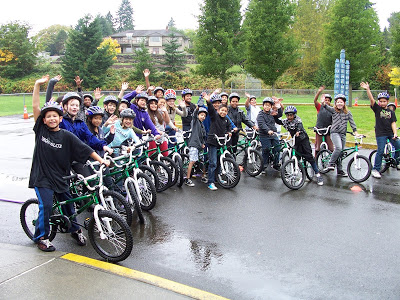Transportation funding issues remain uncertain on the federal level, but on Saturday the U.S. Senate’s unanimous passage of a two-month transportation extension means summer projects will receive funding until July 31. The transportation extension sets up a summer showdown about what to fund and how to pay for transportation on the national level.
Do you think the only debate around statewide funding for biking and walking is happening in Olympia? Think again.

In the next federal transportation reauthorization, Congress could restrict investments for Safe Routes to School.
Just days ago, Congress passed a two-month transportation extension to keep biking, walking, transit, and road projects going around the country through the summer months. The reason for such a short stopgap measure? Disagreements persist on how to fix the federal transportation funding formulas that have historically relied on an increasingly broke gas tax revenue model. As commentators have observed, cars don’t pay enough for the roads they use and the federal gas tax offers another example of that: currently the federal government spends $50 billion annually, but only $34 billion of that comes from gas tax. The remaining $16 billion comes from a hodgepodge of federal income tax “transfers” and other tax extenders.
These federal dollars are significant sources of funding for biking and walking projects at the state and local level. In the 2013-15 state budget, federal dollars amounted to over $12 million of the $18 appropriated to the Safe Routes to School state grant program. Between 2000 and 2014, almost $198 million in bicycle and pedestrian projects funded via the Puget Sound Regional Council came from federal funding. While not as large, other Metropolitan Planning Organizations statewide also distribute federal money that provides critical investments for biking and walking projects.
How Congress decides to deal with this ongoing problem of federal transportation funding has real implications for bicycle projects around the state. One of the biggest concerns that Washington Bikes will continue to monitor remains whether Congress will restrict the funding eligibility for biking and walking projects. Despite the fact that the gas tax doesn’t adequately cover federal transportation spending, some continue to suggest that motor vehicles should receive all of the federal transportation dollars. Using this incorrect information, those same interests are seeking to limit the choices of states and local governments on how to invest in cost-effective biking and walking investments.
While the federal uncertainty persists, Washington Bikes continues work with you to advocate for more biking investments at the state level. The funding composition in a state transportation spending package will become even more critical for biking and walking, if federal transportation dollars are restricted to projects that don’t include biking and walking. Write your state legislators today to ask them for more investments in safety and mobility.



